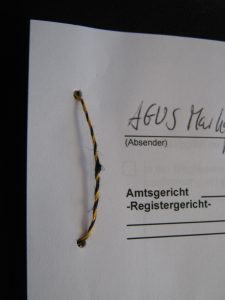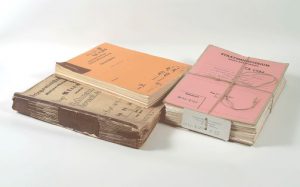Some of our teachers of German in London were Jewish emigrés (I suppose that’s what we called immigrants then). For instance, I first learnt German at school from a Fräulein (Ruth) Hoeniger, who must have had a stroke a couple of years after I started and so I did not know her for long. I wasn’t even sure she was Jewish, but research indicated she was, and was born in Berlin and taught at schools in Leipzig in the 1930s. I wondered if she was related to the Johann Hoeniger who designed one of the Berlin synagogues, but was unable to confirm that. At university, one of our teachers was Dr. Ilse Graham. I did not know that her husband was a cardiologist at Great Ormond Street hospital, but here is an obituary of him in The Guardian. There are also memoirs online, Scattered Leaves, with photos, typed up by his son at dictation (I got that from a comment on The Times obituary). He was 98 when he died this year.
Having initially as a child wanted to study dentistry, at the age of about 10 I decided that this would be too limiting. I thought I should study medicine. At the age of about 16, when I first went to England, my parents gave me a book by an Ernst Scharrer, called The Brain. I had carried this with me for years and, much later in my story, when studying at Western Reserve, I had a Professor of Anatomy, by the name of Hoerr – and then a new person joined the staff, by the name of Scharrer! The penny dropped that this must be the same person who wrote my precious book. After his first lecture – he was an outstanding teacher, who would draw his complex diagrams with both hands), I went up to him and asked him if he was indeed the author of that book. He was amazed and asked how I knew of it – and then asked me to bring it in, which I did. At which point, he examined it closely and then said: “As far as I know, this is the only copy of my book in existence”.
What had happened was that he had just been appointed head of a major neuroscience institute in Frankfurt, recognized to be a very brilliant man. They were not Jewish, but as Hitler grew in power, they decided that they didn’t want to carry on living in Germany and emigrated to the United States, ending up as an Assistant Professor at Western Reserve. But because of the way they left – pretending to go on holiday and not wanting to take possessions such as his book, which might give the game away – he was not able to bring a copy with him. Meanwhile, the Nazis, because of the way he left, destroyed all of his books.
Gerald Graham, born Gerd Greiffenhagen, tells his eventful life story lightly. He emigrated first to England, then to the USA with his parents, and then to the UK again, in the McCarthy era.
Emigrating didn’t solve everyone’s problems:
When war first broke out on 1st September 1939, very little happened for a while. It was called the Phony War. During this period, the British Government found itself with several thousand German Jews about whom it knew little. How could it be sure they were not Nazi informers? It decided to intern the lot. They were in fact legitimate Jews, including professors and musicians. Some were sent to the Isle of Man and others to Canada and Australia. Ernie, who had volunteered to join the British Army, but was interned instead, was sent to Australia on a small ship. The “Dunera”, embarked on 10 July 1940, with 2,542 detainees, all classified as “enemy aliens,”. They included 200 Italian and 251 German prisoners of war, as well as several dozen Nazi sympathizers, along with 2,036 anti-Nazis, most of them Jewish refugees. The British crew of the ship understood nothing of the politics and circumstances of the Jewish group and, when the Nazis started to fight with the Jews on board, the crew took the side of the Nazis. They had terrible fights over about six weeks on a daily basis. As well as being dangerous, it was of course incredibly upsetting to have escaped to England and then to be placed at the mercy of those they had escaped from. Ilse remembered the case of one aged Jewish professor, whose manuscript – his life’s work – was thrown into the sea with a laugh by British crew members. The moment they got to Australia, telegrams were sent and it became known to the authorities what had happened and there was a debate in Parliament about it, with the Government fiercely attacked for allowing such a thing to happen. Steps were taken to have the Jews sent back to England.
I should also recommend Judith Kerr’s three-book autobiography, starting with When Hitler Stole Pink Rabbit.
(With thanks to Professor John Flood – not the only one I know)



